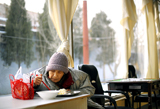Taipei Times - archives
http://help.funp.com/lib/exe/fetch.php/funp/tools/tools_postbtn_script.png?cache=cache
FEATURE : Graying China: most are getting old before getting rich
SHORTAGE: The tens of millions of one-child homes, as well as worker and student migration to urban areas, have destroyed the traditional nuclear family modelAFP , BEIJING
Thursday, Jan 14, 2010, Page 5
 |
| An elderly woman eats lunch at a nursing house in Beijing on Friday. PHOTO: AFP |
The best part? Having mahjong partners.
“This is much better than being with my children. They have to go to work, and no one has the time to talk with me. My son did not even have a room for me,” said the former school teacher.
With more than 160 million people over the age of 60 and its ageing rate gaining pace, China is facing a curious problem: it is graying while still in development — a challenge other economies have only had to face at a more advanced stage.
The speed at which the number of elderly in China is increasing has alarmed both the government and demographers about the future, with the nation’s healthcare system already straining and two-thirds of rural workers without pensions.
“Population ageing is going to be a big social problem in China,” said Wang Xiaoyan, the founder of Community Alliance, one of the few non-governmental organizations in China that addresses the needs of senior citizens.
The first generation of parents affected by China’s population control policy put in place in 1979 — which the government says has averted 400 million births — is now hitting age 60.
The tens of millions of one-child homes, coupled with mass migration of students and workers to urban areas, has destroyed the traditional nuclear family model.
Instead, ordinary Chinese are coping with a 4-2-1 inverted pyramid — four grandparents and two parents, all the responsibility of an only child.
As a result, half of China’s over-60s — 80 million people, or roughly the population of Germany — live in “empty nests” without their children, who are unable to assume responsibility for their ageing parents.
“This is why we have problems now,” said Wu Cangping, a 88-year-old demographer who still teaches at Renmin University.
“Children do not have enough money to take care of their parents. We’re getting old before we are getting rich!” Wu said.
The thorny problem of a graying population has not escaped notice in the corridors of power in Beijing.
Authorities have put in place a system effective this year that will give pensions to 10 percent of rural workers. In recent years, they have also been raising healthcare allotments for the elderly.
The government wants to allow 90 percent of older people to receive family care with welfare assistance, 6 percent to receive state-backed community care services and the other 4 percent to move to nursing facilities.
But the country’s 40,000 retirement homes only have 2.5 million beds — enough for barely more than a quarter of the 8 million it needs.
“Today, we need 5.5 million more beds to fulfill demand,” Wang said.
At the Ren Ai home where Ma lives, construction work is under way. Soon, 400 more beds will be available, a major jump from the 100 on offer, director Wang Liwen said.
“There are not enough nursing homes,” said Wang, who has a backlog of between 200 and 300 admission applications.
The residents of Ren Ai, most of them former workers and farmers with tiny pensions, pay between 1,350 yuan and 1,550 yuan (US$200 to US$225) a month to live in the home, says the parka-clad Wang in her chilly office.
In the older parts of the home, walls are crumbling and carpets are faded.
She offers a tour of the new, windowless 215m² rooms— to be shared by up to three residents.
“If their pension is not high enough, or if they don’t have one at all, the children pay. But some older people have no children and no money, and we take care of them too,” he said.


0 Comments:
Post a Comment